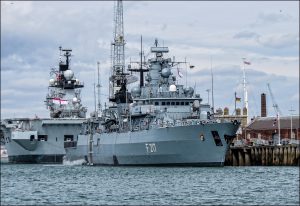In an interview with the Sydney Morning Herald on November 2, German Defense Minister Annegret Kramp-Karrenbauer declared that her country will dispatch a frigate to patrol the Indo-Pacific from next year. Noting that Germany intends to ramp up collaboration, both at bilateral and multilateral levels, with regional powers in face of growing security challenges in the vast maritime theater, Kramp-Karrenbauer added, “That could include, for example, the embarkation of German officers on Australian Navy units – a project that is being negotiated as we speak.”
Her remarks comes two months after Germany became the second European Union member to release guidelines for the Indo-Pacific. France’s foreign ministry released a strategy document in 2018 for the Indo-Pacific, following a major policy speech by President Emmanuel Macron in Australia earlier that year. A subsequent French security strategy for the region was released by the country’s defense ministry in 2019. The German document reflects a whole-of-government approach, with a pronounced focus on the European Union’s role. The German government hopes that the “guidelines on the Indo-Pacific region can be used as the basis for a future EU strategy.”
“I am convinced territorial disputes, violations of international law and China’s ambitions for global supremacy can only be approached multilaterally,” Kramp-Karrenbauer told the Sydney Morning Herald’s Eryk Bagshaw and Latika Bourke. The paper also quoted her as saying that Germany is “working within NATO” to build defense relations with regional actors.
Kramp-Karrenbauer’s comments come amid a burst of interest in Europe about the Indo-Pacific, driven not just by security concerns but also around China’s technology and geoeconomic thrust. True to the emerging security architecture in the region that looks beyond the traditional American hub-and-spoke alliance model, European powers are approaching the region in a networked fashion. As an example, France has not only strengthened its bilateral relations with actors such as India and Australia, but the three now also participate in a trilateral dialogue.
On its part, the German Indo-Pacific guidelines center the 10-nation Association of Southeast Asian Nations (ASEAN) institutions and the role of the EU as an ASEAN partner even though it also seeks to engage other institutions such as the Pacific Islands Forum, the Bay of Bengal Initiative for Multi-Sectoral Technical and Economic Cooperation (BIMSTEC) and the Indian Ocean Rim Association. Interestingly, as means to uphold a rules-based order in the region, the German government also seeks reform of the United Nations Security Council (UNSC). Along with Brazil, India, Japan, and South Africa, Germany is contending for a permanent membership in the UNSC. The September German Indo-Pacific guidelines notes that Germany would work with India and Japan toward UNSC reforms.
Despite being China’s biggest trading partner in Europe, the Angela Merkel-led coalition government in Berlin has adopted a tough line on China in the recent past. At the latest Third Committee meeting of the United Nations General Assembly, Germany – supported by 38 other countries – strongly condemned China’s treatment of the ethnic Uyghurs in Xinjiang as well as the new national security law Beijing imposed in Hong Kong over the summer.
Analysts have also pointed out that beyond concerns around regional security, Chinese 5G equipment (and its national security implications) as well as Beijing’s infrastructure lending practices – widely described as predatory – the ongoing COVID-19 pandemic has also contributed to growing skepticism about China within the EU.
But at the same time, by prudently eschewing a unilateral approach to the Indo-Pacific, European middle powers have demonstrated their capabilities limitation when it comes to meeting hard security challenges in the region, and have chosen to pass the buck when it comes to difficult tasks around curbing Chinese maritime expansionism. For example, Kramp-Karrenbauer, in her interview with the Australian newspaper, refused to comment on whether the to-be deployed German frigate will participate in freedom of navigation operations (FONOPS) in the South China Sea. Genuine FONOPS involve sailing within 12 nautical miles of features built and/or claimed by China, a task only the United States Navy has attempted in the past – and not too many times. Adding to this, the obvious: a sole German frigate, if it were to operate in the region alone, does not stand to carry a strong military signal.
But perhaps all this is beside the point. The very fact that European powers such as Germany – long considered soft on China by many in Asia – are increasingly raising concerns about Beijing, and concurrently adopting the notion of the Indo-Pacific as a unified theater of interest is in itself a major shift. As Australian National University’s Rory Medcalf tweeted, the Kramp-Karrenbauer interview is the “[l]atest data point for those who like to think the Indo-Pacific idea is some passing US-centric folly.”
Reports in September suggested that Germany is considering passing a law that would make it very difficult for the Chinese firm Huawei to dominate the German telecom market, Europe’s largest. In her interview, Kramp-Karrenbauer noted “we Europeans can only operate technology we trust.”
































